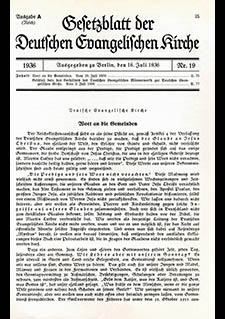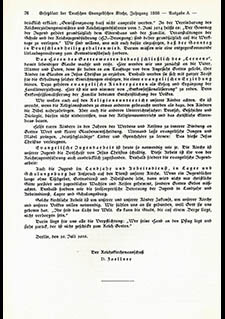“De-confessionalization” Propaganda Campaign
In a propaganda speech in Münster on July 7, 1935, Reich Minister of the Interior Wilhelm Frick demanded the de-confessionalization of all of public life. Frick’s remarks were primarily aimed at the many religious professional associations, the church press and church youth organizations.
Thus began a systematic and large-scale campaign against church organizations that jeopardized the Nazi state’s claim to a monopoly. Frick additionally asserted: These organizations engage in activities in domains to which the Nazi state must lay claim to for itself alone. All of these things are apt to disturb the German Volksgemeinschaft (racial national community). We will no longer allow anyone to destroy this Volksgemeinschaft, however. His goal was to eliminate churches from public life to the largest extent possible.
Under the propaganda slogan of “de-confessionalization”, members of religious professional associations were urged to resign from them. The church press was subjected to numerous hindrances and bans.
“School referendums”, in which parents were threatened with reprisals in the event they did not vote for the non-denominational state school, were staged in order to abolish denominational church schools. Undesired subject matter such as the Old Testament in particular was supposed to be eliminated from religion class and replaced by Nazi ideology. The Hitler Youth scheduled its events on Sundays and holidays in order to deter children and young people from attending church services.
These measures and the anti-Christian propaganda simultaneously employed by party officials and Nazi press affected the Protestant and Catholic church in equal measure. They had an impact not only on the Confessing Church but also the entire Protestant church, including even the German Christians.
Pastors and congregational members who had not kept out of the disputes between then Confessing Church and German Christians also saw hitherto established fields of church work increasingly restricted. This prompted even the Reich Church Committee appointed as the church government by Nazi Reich Minister of Church Affairs to adopt a critical tone in July of 1936 in a “Word to Parishes”.
In cautious formulations, it complained about the disparagement of the Christian faith, the holding of party and Hitler Youth events on Sundays and the measures against Protestant preschools, religion class and the church’s youth work.
Unlike the Confessing Church’s protests– most notably the Provisional Church Government’s Memorandum to Hitler – the committee did not however hold the state and party directly accountable and refrained from any criticism that went beyond purely ecclesiastical affairs. Even that was too much for its German Christian members: Although they had approved the “Word to Parishes”, they attempted to prevent its publication.
Source / title
- Gesetzesblatt der Deutschen Evangelischen Kirche No. 19, July 16, 1936, p. 75f.; ©EvAKiZ München.


